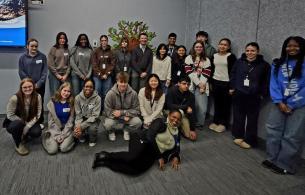How to change your perspective
At first, changing the way she worked seemed like a terrible idea.
“I don’t like change and I knew I was retiring soon,” Kathy Sloan says.
She was not interested in going through a major career shift.
Kathy, 64, had been a Home and Community Care (HCC) nurse in Mackenzie for 17 years. She mainly worked alone, consulting with the Health Services Administrator on complex issues.
The new way of working, in an integrated primary and community care model, would mean she had to start working on an interprofessional team and in a different way with the primary care physicians.
Kathy didn’t see the benefit.
“I’ve always worked as a team,” Kathy says. “I had easy access to everyone and the doctors and other nurses were always close by.”
“I was in a groove in my role,” she adds. “I resisted the change so much that I wore a groove right in the pavement!”
But when Kathy realized that this new way of working was here to stay, she decided to shift her perspective.
“I started to think about the clients and the people I’m serving,” Kathy says. “If the change is better for them, then I need to get on board.”
Fast-forward a year or so, and now Kathy is on an interprofessional team that she describes as “great,” with “awesome support” for each other.
Kathy has seen many benefits from the new team approach
“Everyone gets on board [to help the patient] quicker,” she says. “As we work together, it’s so fruitful.”
Other benefits Kathy has seen from working in an interprofessional team:
- The team is very client-focused.
- It’s amazing what comes out of team huddles in only a half-hour period.
- Everyone is contributing – community paramedics, primary care nursing, life skills worker, doctor, mental health counsellors, etc.
- There is more awareness of serving the client and helping out other team members.
“I really felt defensive to the change at first,” Kathy says. “It made me question, was I doing my job properly?”
But in the end she came to realize that the changes were not about her, they were about the people we are here to serve. Kathy has a great team lead in Mackenzie who has been supportive throughout the process and collaboration is so much easier now.
To anyone who is new to the work, or maybe even struggling with the change, Kathy suggests to just “keep going, you are always developing and changing at work, as a person and in life. There are good leaders out there that will help you in your transitions, connect with them, share your frustrations, ask for help and push past your comfort zone and take a chance on moving forward!”














Comments